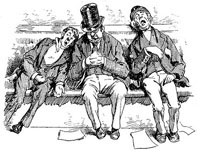
Visits to “Purgatory”
WEDNESDAY MORNINGS AT THE NURSING HOME
Each Wednesday I go — sometimes reluctantly, never quite at ease — through the doors of a local nursing home. There in a common room I join a group of 40 or so patients, most of them in wheelchairs or on pallets. About half are alert and fully responsive. Some are sedated; some seem unsure of where they are; some murmur in pain or in prayer. A few are incontinent and lie on their pallets half-conscious, with open eyes that seem not to see. One or two pound the arms of their chairs in wordless unhappiness.
Two young nursing aides go among them, bringing a comforting word, a cup of water, a favorite teddy bear. The gentleness of these girls is always surprising, and though it is welcome it is also unsettling, for their hired comfort seems a faint echo of the world that should be: the world of families, grandchildren, and filial love. Here old people, mostly women, spend their last days, waiting to die. Some seem to be alive through sheer force of habit. Others are lively, eager for a word, a touch, a smile. The aides, young enough to be their grand- or great-grandchildren, call the old people by their first names. Though I have come here for several years now, I still cannot decide: Is this familiarity a comfort, or another small indignity among many others that age and illness have visited upon them?
I have come to bring them the Eucharist. Just after I had completed my training in my parish as a Eucharistic minister, someone mentioned this ministry and I volunteered. I hardly know why. I’m getting older myself. At my parish church I am one of that crowd of older folks at daily Mass. When I was younger, I recall, the “daily Massers” were thought of as people who considered themselves “good Catholics” — people who were maybe showing off a bit. But now that I too am a fixture at daily Mass, I realize that we see ourselves not as Catholics who are extra good but as Catholics who are extra needy. We cannot function fully without the daily sacramental discipline. To paraphrase St. Paul, “It is in being weak and vulnerable that we can become strong.”
It is one thing to admit my weakness and neediness among the relatively vigorous folks at daily Mass. It is another to see such weakness and vulnerability as I see here each Wednesday morning. Here bodily vigor has vanished, the fleshly future is foreclosed, and I see my own inevitable decline modeled for me. Is there strength to be found in weakness so complete as this? There are Wednesdays when I drag my feet, waiting for the cosmos to hand me some valid note of excuse from my duty at the nursing home. (It hasn’t happened yet.)
You May Also Enjoy
The entirety of the Christian faith hinges on the fact that God assumed creation to Himself in an unmatchable and eternal way.
Father Simon Rinaldo Smith, the crazy old priest/forest ranger in Walker Percy’s The Thanatos Syndrome,…
We need an overall increase in knowledge of the Catholic religion among all age groups in each diocese, in particular as concerns the sacraments.

